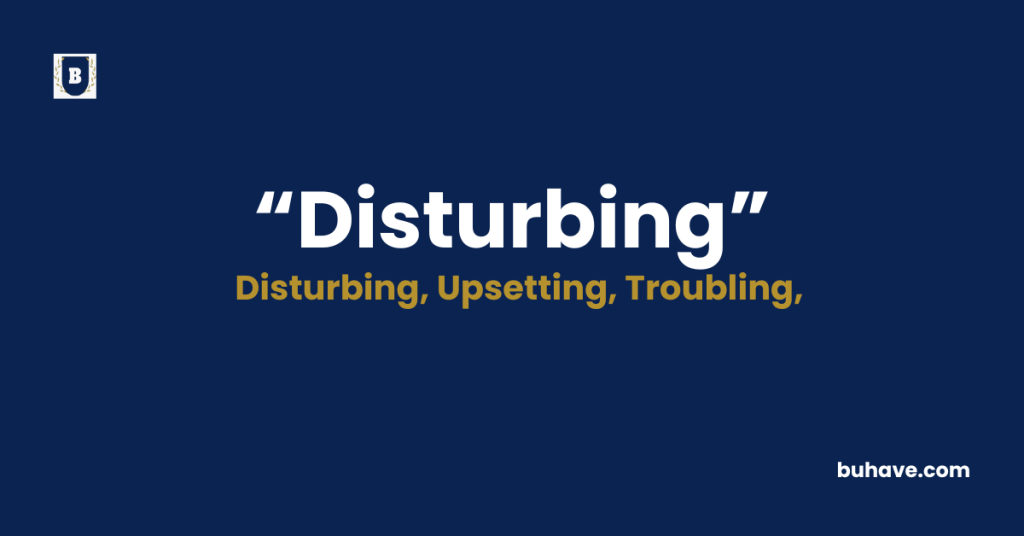The word ‘Disturbing’ (Adjective) refers to something that causes anxiety, discomfort, or emotional distress, often by challenging our sense of safety, peace, or moral expectations. In this guide, you’ll learn the full definition, synonyms, antonyms, etymology, and real-life examples of how to use ‘Disturbing’ correctly in sentences.
Disturbing Explained in Depth
A complete and detailed guide to the word Disturbing including meaning, definition, examples, etymology, synonyms, and antonyms.
Meanings of Disturbing
‘Disturbing’ is used to describe anything that causes emotional or mental unease. It often relates to images, experiences, or information that shock, frighten, or deeply unsettle people. This word conveys a disruption of inner calm, either due to moral conflict, fear, or upsetting content. For instance, a disturbing movie may include graphic scenes that haunt the viewer long after it’s over. It can also describe situations or events that interfere with comfort or peace, like a disturbing noise during the night or a disturbing trend in society. The term is widely used in psychological, social, and personal contexts to express discomfort or distress.
Definition
Disturbing means causing feelings of worry, shock, fear, or emotional upset. It refers to anything that negatively affects one’s mental state or peace of mind, often because it challenges norms, introduces danger, or reveals unpleasant truths. While it often carries a negative connotation, “disturbing” can also be used to highlight important or provocative issues, such as disturbing statistics or disturbing realities that need attention. In this way, the word can serve both descriptive and impactful purposes.
Etymology
The word “disturbing” comes from the verb “disturb,” which has Latin roots in “disturbare” from “dis-” meaning apart, and “turbare” meaning to throw into disorder or confuse. Over time, the word evolved through Old French and Middle English to take on its current form and meaning. This origin reflects the idea of something being thrown out of balance — a fitting image for how disturbing things disrupt emotional or psychological stability.
Example Sentences
- The documentary featured disturbing footage from the war zone.
- He shared a disturbing dream that left him anxious all morning.
- It’s disturbing how quickly misinformation spreads online.
- The sudden silence was more disturbing than the noise had been.
- Some people find horror movies too disturbing to watch.
Disturbing Synonyms
- Upsetting
- Frightening
- Unsettling
- Alarming
- Distressing
- Shocking
- Horrifying
- Troubling
- Terrifying
- Jarring
Disturbing Antonyms
- Comforting
- Calming
- Reassuring
- Soothing
- Peaceful
- Relaxing
- Encouraging
- Pleasant
- Innocuous
- Agreeable
FAQs about Disturbing
Here are some frequently asked questions (FAQs) about the word “Disturbing”
1. What does “disturbing” mean in everyday conversation?
It describes something that causes mental discomfort, shock, or emotional distress.
2. Can “disturbing” be used to describe people?
Yes, if their behavior or ideas provoke discomfort or fear — for example, “a disturbing individual.”
3. Is “disturbing” always negative?
Mostly yes, but it can also serve a constructive role by drawing attention to important issues that are emotionally difficult.
4. How is “disturbing” different from “scary”?
“Scary” often refers to fear caused by danger, while “disturbing” usually implies emotional discomfort or moral unease.
5. Is it appropriate for formal writing?
Yes, especially in academic, psychological, or journalistic contexts to describe content that is emotionally or ethically unsettling.
6. Can art or literature be described as “disturbing”?
Absolutely. It’s common to call books, movies, or artworks disturbing if they evoke strong, often dark, emotional responses.

















